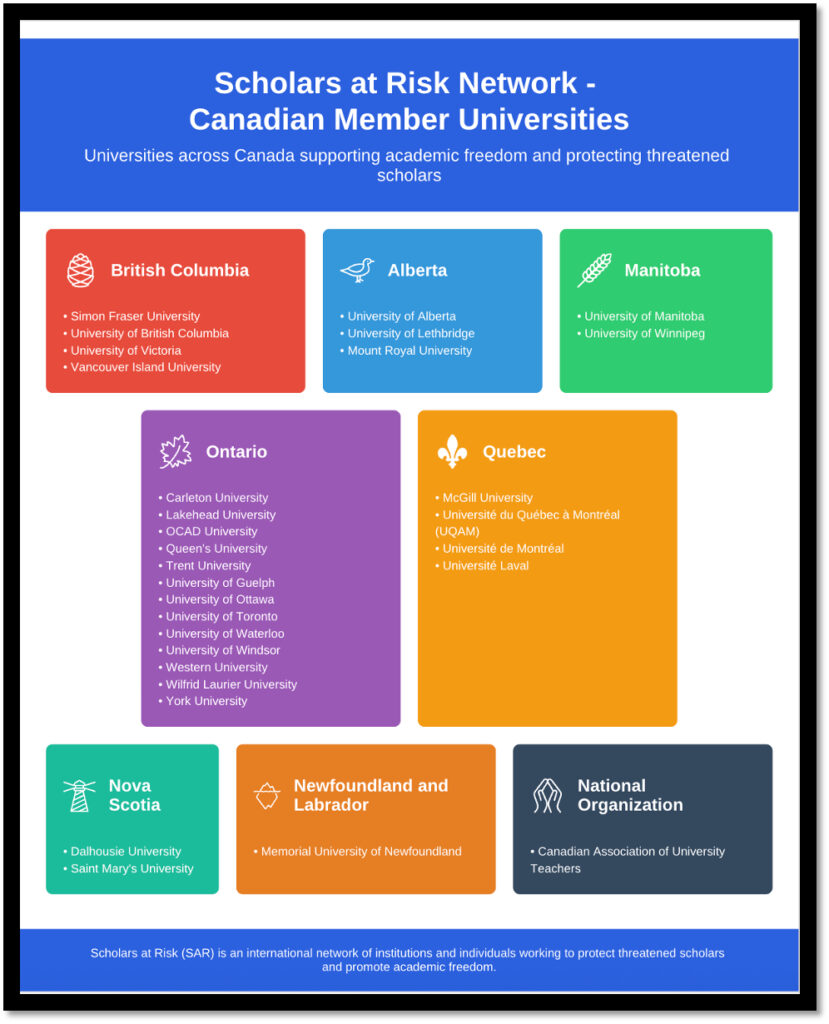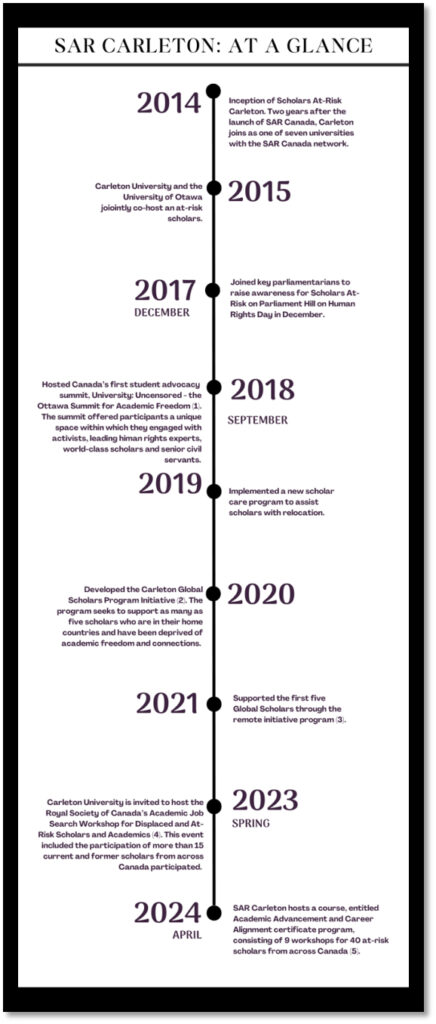Scholars at Risk — Frequently Asked Questions
General Information:
- Who is an at-risk Scholar?
According to Scholar at Risk Network’s Frequently Asked Questions: “At-risk scholars include professors, researchers, doctoral students, institutional leaders and other members of higher education communities who are threatened and/or attacked as a result of the content of their work, their status as academics or as a result of their peaceful exercise of the right to freedom of expression or freedom of association.”
You can learn more about at-risk scholars, professors, researchers, scientists, artists, and journalists on the Scholars at Risk Network’s website.
- What is Academic Freedom?
Academic freedom can be defined as the “freedom of teaching and discussion, freedom in carrying out research and disseminating and publishing the results thereof, freedom to express freely opinions about the academic institution or system in which one works, freedom from institutional censorship and freedom to participate in professional or representative academic bodies.”
- Why is supporting at-risk scholars important?
- Preservation of Academic Freedom: It protects the right to free inquiry and expression in academia.
- Protection of Human Rights: It gives safety to people who are in danger because of their ideas, research, or identity.
- Enrichment of Academic Communities: These scholars bring diverse perspectives and experiences that enhance learning and research.
- Global Solidarity: It demonstrates a commitment to global justice and the protection of intellectuals worldwide.
- What is the “Scholars at Risk (SAR)” Network?
The Scholars at Risk Network is an international organization that works to protect threatened scholars and promote academic freedom worldwide. The network helps provide sanctuary, protection, and advocacy for scholars who are unable to safely continue their work in their home countries. SAR assists these scholars by arranging temporary academic positions, advocating for their rights, and raising awareness about threats to academic freedom.
- What is the “Scholar Rescue Fund”?
The Institute of International Education (IIE), “an independent not-for-profit organization, has supported opportunities for persecuted scholars since 1919. In 2002, IIE launched the Scholar Rescue Fund (IIE-SRF) to formalize its commitment to protecting the lives, voices, and ideas of scholars around the globe.”
- How can universities help at-risk scholars?
- Join international networks as a member university
- Host a scholar at risk at their institutions
- Support research and advocacy efforts related to protection of at-risk scholars
- Raise awareness through events, panels, and public programs
- Provide learning opportunities such as fellowships, workshops, and training programs
- Offer financial support or fundraising initiatives to sustain scholar placement and protection efforts
SAR Canada
- What is the SAR-Canada Section?
The SAR Canada Section, “comprising over 30 university members, exists to promote the values, aims and activities of Scholars at Risk in Canada. The SAR Canada Section was formally launched on June 22, 2012, at the University of Toronto’s Massey College by the Honourable Dr. Lloyd Axworthy, then President and Vice-Chancellor of The University of Winnipeg. The launch of the Canadian Section represented the culmination of several years of partnership between Canadian higher education institutions and the Scholars at Risk Network.”

- How many universities in Canada are SAR members?
As of the latest reports, over 30 Canadian universities are members of the SAR Canada Section. These institutions collaborate to host at-risk scholars, engage in advocacy, and promote academic freedom within Canada and globally.
- What academic disciplines do SAR scholars in Canada represent?
SAR scholars currently hosted in Canada come from a wide range of academic fields, including physics, agriculture and plant science, business and economics, public policy, biology, and education. If more detailed data on scholar placements is needed, it can be provided upon request.
- What are the post-placement outcomes for SAR scholars in Canada?
Post-placement outcomes vary by individual. While complete data for all scholars is not available, a recent SAR alumni survey showed that 62% of former scholars are currently employed, with 82% of those working at least part-time in academia. Scholars participating in the conference may also share personal insights that offer a more nuanced view of these outcomes.
- How many scholars are in Canada?
It is difficult to provide an exact total for all SAR placements in Canada to date. However, there were twelve placements in fiscal year 2024 and twenty-three in fiscal year 2023. Currently, eleven SAR scholars are in active placements across the country, with many alumni having remained in Canada. Additionally, six more scholars have received offers from Canadian institutions and are awaiting visa approvals.
SAR at Carleton University
- What is the SAR initiative at Carleton University?
The Scholars at Risk (SAR) initiative at Carleton is dedicated to helping scholars who are facing threats to their lives due to their scholarship. We work to protect scholars (and their ideas) and promote academic freedom by arranging one-to two-year appointments in host departments across the university. Carleton SAR partners with the Scholars at Risk Network and the Institute of International Education’s Scholar Rescue Fund (IIE-SRF) to arrange these annual appointments.
- How is SAR Carleton program funded?
At a time when university budgets are increasingly constrained and global support for foreign aid is in decline, operational funding is more critical than ever. Our ability to host at-risk scholars and provide meaningful programming depends on sustained core support. To learn more or support the initiative, please visit Carleton’s Future Funder website and search for Scholars at Risk or click on this link: Carleton Future Funder

- How does Carleton University support scholars through the SAR program?
Scholars often need support beyond their academic roles to cover basic needs such as English language classes, medical coverage, and immigration-related legal advice. The SAR team at Carleton meets these needs through a combination of institutional support, community fundraising, and external grants, which have grown over time. The Carleton SAR team has also developed online resources, and a scholar care program, and the Academic Career Alignment Course to support scholars’ integration upon their arrival in Canada.
- How does Carleton University engage with the community to support at-risk scholars?
Carleton enhances its academic environment by integrating the diverse perspectives of displaced scholars, which fosters new research connections and supports their professional development in line with UN Sustainable Development Goal 4 (Quality Education). In 2024, Carleton developed a national pilot program called Academic Career Alignment, designed to provide academic and professional training for at-risk scholars as they navigate their next steps in Canada.
- How many at-risk scholars are hosted by SAR Carleton program?
Since 2014, SAR Carleton has hosted more than 20 scholars, who have taught and researched in different departments of the University across various disciplines, including eight in the social sciences; five in natural and applied sciences; four in business; and four in humanities. Carleton University has welcomed more that 14 of these scholars in person and another six remotely.
- What is the gender breakdown of SAR scholars at Carleton University within Canada?
As of the latest available data, approximately 1/3 of at-risk scholars are women.